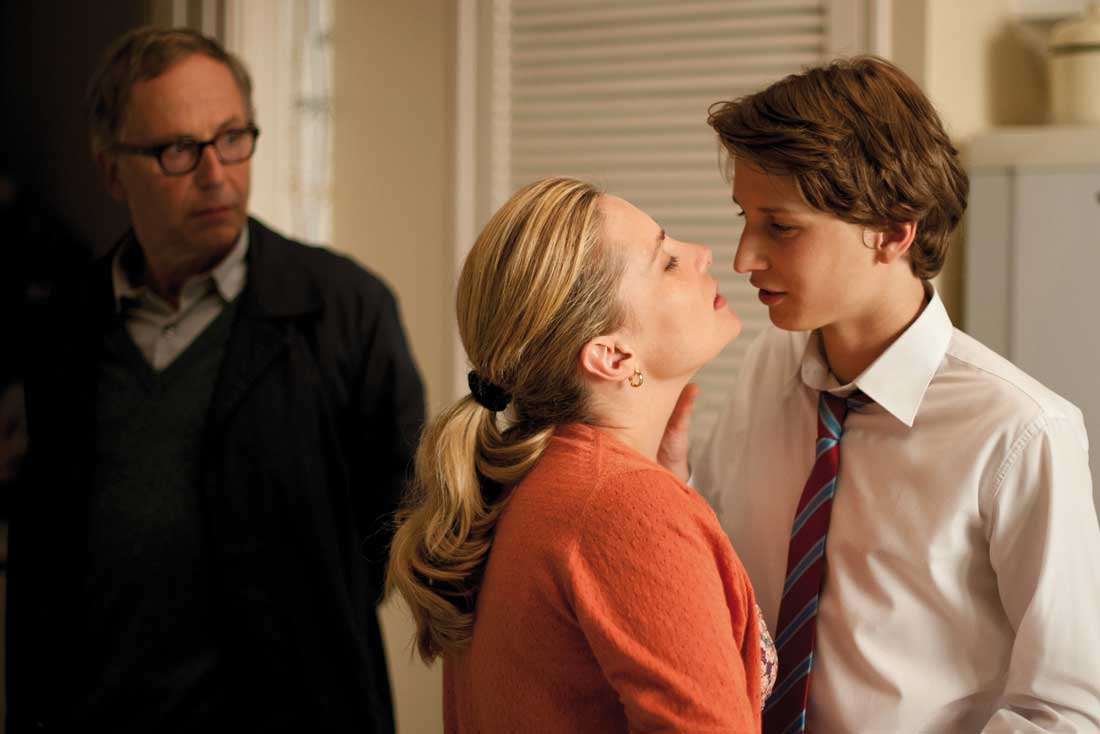For the last 15 years, François Ozon has been one of the world’s most fascinating filmmakers. On one hand, he makes airy, farcical, Almodóvar-on-a-sugar-high period fantasias like Potiche, Angel, and 8 Women. On the other, he makes tense, complex, Hitchcockian, contemporary psychological thrillers like Swimming Pool and Under the Sand. The Frenchman has skill, verve, a sense of humor, and a sensibility infused with camp and melodrama. He has even made films partially or entirely in English. Yet somehow he has never quite broken through with American audiences. That deserves to change with his latest film, the puckish and kaleidoscopic In the House, which opens this weekend at the Modern Art Museum of Fort Worth. As an introduction to this clever and uncategorizable filmmaker, it’s as good as there is.
Based on El chico de la última fila, a Spanish play by Juan Mayorga, the film begins with Germain (Fabrice Luchini), a Parisian teacher of literature who often despairs of his high-school students’ writing abilities. Exempt from his despair is 16-year-old math nerd Claude Garcia (Ernst Umhauer), who hands in a writing assignment describing a visit to the home of his friend Rapha (Bastien Ughetto), a wealthier, basketball-playing classmate. Claude’s essay is acutely detailed and brimming with class envy and barely hidden sexual desire, and he subsequently spins his stories of his later visits into an ongoing domestic saga. His keen observations about Rapha’s family absorb both Germain and his art gallery-managing wife Jeanne (Kristin Scott Thomas), to whom the teacher shows his student’s papers.
Like many other Ozon movies, this one plays extensively with the relationship between fiction and reality. (Also like most Ozon movies, it has a same-sex makeout session.) Besides wondering how much of Claude’s tale is invented, Germain and Jeanne also hold spirited debates about the characters. Why does Claude keep going to Rapha’s house? Does he envy their upper middle-class lifestyle? Or does he simply want to have sex with Rapha’s beautiful, discontented mom (Emmanuelle Seigner)? In between assignments, Germain doles out tough, sophisticated critiques to his pupil, urging him to develop characters and throw out plots that don’t work. Claude’s initial attempt at a romantic ending is brushed aside by Germain, “That’s pure Barbara Cartland!”
Ozon sprinkles in both highbrow and lowbrow literary references with abandon, and he plays much of this movie as whirling comedy. Some of his other films have been on the languid side, but this is the most quick-hitting piece of work he’s ever done, as he zips between Claude’s overheated imaginings and Germain’s analysis, which grows increasingly less cool-headed as the teacher is drawn into the story. The actors’ high-energy performances add to the movie’s antic tone, and Ozon includes some sharp satire of France’s educational system and the art world. The bad art in Jeanne’s gallery will make you laugh out loud.
Eventually, the movie takes on a house-of-mirrors quality as the boundaries between the scenes in Rapha’s house and the rest of the movie evaporate. Germain appears in the flashbacks and critiques events as they’re happening. When Rapha sees his mom kissing Claude, the teacher stands right next to the stricken-looking Rapha while sneering, “Great, just what we need! This has turned into bad farce.” Germain and Jeanne turn up as unflatteringly drawn characters in Claude’s papers, with the former depicted as a frustrated, untalented novelist. Reading this, Germain shrugs, “He’s not wrong.”
This is all great fun, but in Ozon’s movies, serious ideas always lurk beneath the hijinks (if not always successfully). The tone shifts late in the film as both the content of Claude’s stories and Germain’s relationship with the kid veer into perilous territory. Ozon nods toward a dark, Claude Chabrol-like ending for this story, but he always heeds Germain’s advice to Claude, “A great ending makes the audience think, ‘I never expected that, but it couldn’t have ended any other way.’ ” In the House pays tribute to the elemental power of storytelling and ends with a great shot. This story turns out to be the key that opens up a whole host of others, and they all play out for us in a breathtaking vista.
[box_info]
In the House
Starring Fabrice Luchini and Ernst Umhauer. Written and directed by François Ozon, based on Juan Mayorga’s play. Rated R.
[/box_info]












